In the days when computers filled the size of your front room most people used paper to log their QSO, but today electronic QSO logging has a number of advantages. I was first licensed in 2003, and I took the decision to electronically log from the start. I mainly operated digital modes, so electronic logging was the only way to add calls and so this became the usual way I log.
The choice of electronic logbooks will depend on your preference, band and operating modes. Some electronic logs are free, others are integrated with the digital modes software like HRD.
Electronic logging can be split into two parts, what do you use to record the QSO while on air and subsequently how do you save this and gain any DXCC or other awards.
So lets look at the QSO stage first.
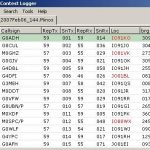 Minos for VHF and UHF – The program is free and open source written by Mike G0GJV and you can read the history of its development on his site. Its the best VHF contest software, so thank you Mike for this sterling effort.
Minos for VHF and UHF – The program is free and open source written by Mike G0GJV and you can read the history of its development on his site. Its the best VHF contest software, so thank you Mike for this sterling effort.
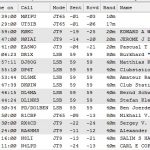 HRD – Ham Radio Deluxe is a paid suite of programs that logs and decodes digital modes.
HRD – Ham Radio Deluxe is a paid suite of programs that logs and decodes digital modes.
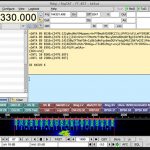 FLDIGI – is a free and open source, the program decodes and logs digital modes. The Wiki page makes interesting reading.
FLDIGI – is a free and open source, the program decodes and logs digital modes. The Wiki page makes interesting reading.
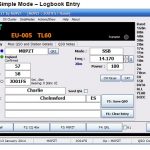 PZT log – is a free program developed by Charlie M0PZT. You also have the option of a more advanced version PZT Pro for just a few pounds.
PZT log – is a free program developed by Charlie M0PZT. You also have the option of a more advanced version PZT Pro for just a few pounds.
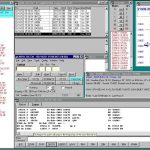 N1MM – is a free program designed for contesting. Developed by N1MM Thomas Wagner it has the reputation of being the most popular logging program in the world. The program can be used as a stand alone logger, but it can be integrated with RTTY to be used in contesting.
N1MM – is a free program designed for contesting. Developed by N1MM Thomas Wagner it has the reputation of being the most popular logging program in the world. The program can be used as a stand alone logger, but it can be integrated with RTTY to be used in contesting.
Doing something useful with your electronic log.
Once you have logged all this data you have a choice to keep it safe on your drive, or upload so the world can see how many people you have worked. Electronic QSL cards or electronic QSO confirmation is the main benefit but keeping track of your WAS or DXCC has never been easier.
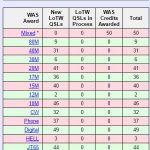 ARRL LOTW – Log Of The World is the defacto standard in electronic QSO conformation. Its the only electronic confirmation system that is recognised and secure enough to allow you to claim DXCC awards. It can also track and credit you for numerous other awards. Yes its a “pain” you have to prove who you are and sign the log before uploading, but its very security is what makes it the trusted authority on electronic QSL. Its not for the paper collectors, you don’t get any pretty pictures but it does what it says on the tin. Oh the best bit is its free.
ARRL LOTW – Log Of The World is the defacto standard in electronic QSO conformation. Its the only electronic confirmation system that is recognised and secure enough to allow you to claim DXCC awards. It can also track and credit you for numerous other awards. Yes its a “pain” you have to prove who you are and sign the log before uploading, but its very security is what makes it the trusted authority on electronic QSL. Its not for the paper collectors, you don’t get any pretty pictures but it does what it says on the tin. Oh the best bit is its free.
EQSL.cc – Electronic QSL cards, with pretty pictures. Its great if you like to collect cards and wanted to save on postage, but their is little or no validation on who the uses the system and so the awards are worthless towards DXCC.
Clublog – Electronic award tracking and confirmation of QSO. Developed by Michael G7VJG.
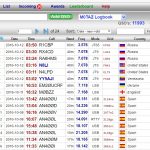 QRZ – They have jumped on the electronic QSL band wagon, sometimes less is more.
QRZ – They have jumped on the electronic QSL band wagon, sometimes less is more.
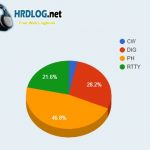 HRDlog.net – Another electronic awards and QSL tracking system
HRDlog.net – Another electronic awards and QSL tracking system
I tend to upload to all of these logs, but only take any interest in the LOTW awards. The other systems help to keep the paper QSL count down, although I reply to any cards received via the RSGB bureau.

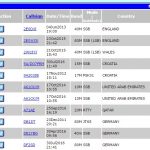
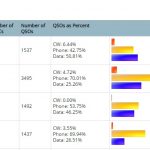
You missed some of the biggest logging programs out there: WinLog32, WinTest, N1MM which we use regularly!! FAIL!
No I dont think its a fail, it was never designed to cover every logging program ! Ive never used Winlog32 or Wintest so dont know anything about them, but Ive added N1MM as its very popular for RTTY contesting. RTTY has never been so popular as a contest mode, and so the absolute number of users is very high. Thanks for your considered feedback.